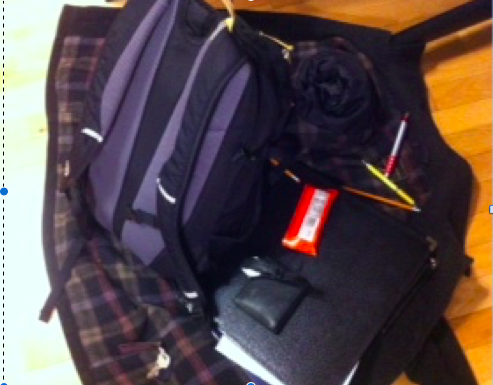If there is one cognitive or thinking problem children face, it is organization- a spoke of executive function- to keep track and get things done across the school and home. Kids who frequently lose their coats and frequent the lost and found bin at school, have things falling out of their locker, and forget to turn in the homework are those that are unable to manage their daily life and are easily frustrated. There is no order or method to cope. This skill to organize can be learnt with guidance. It is joint work with parent and child figuring out what works for the child.
The dorsolateral prefrontal cortex (DLPFC) is connected to multiple other PFC centers, cortical regions such as parietal (spatial organization) and temporal (long term memory) regions, and subcortical regions such as basal ganglia (learning and retention) and the amygdala (emotional control) to orchestrate and drive complex organizational function.
There are so many tips to revamp and invigorate one’s school and personal life that will utilize the higher cortical brain networks. Rethinking how to give a good shake up will add value to daily life skills. Here are some concrete pointers to take stock! This is written in a manner that you can take the role of a coach and address the child as follows. Lighten up won’t you? It does take years, but it will truly work!
1. Planner, a diary or an assignment notebook to write down plans. Owning a cute book that you can designate as the planner can be inspiring. That ‘go-to book’ is where you can jot down all your ideas and things to do, plug them in systematically into the day’s schedule. This helps to reduce overcrowding in the head. The exercise of writing down things to do with assigned dates and times will pace the work. This will automatically help prioritize the immediate three most important things in each category- ASAP today, over the week and month. They give a visual aid and confirmation that you are “on it.” This reduces anxiety. This helps planning and potion control the time.
“If you want to live a happy life, tie it to a goal, not to people or things”- Albert Einstein.
2. Stick to schedule. Once you jot down, the power in the planning leads to execution i.e., following your own plan. Otherwise, the planner is like a paper tiger with no value!
3. Focus on the task at hand and reduce distractions. In this day and age of digital world, if you don’t look at gadgets for any length of time, you feel you are not linked to the world and feel at the worst, ‘some danger is looming over’ and at the best feel, ‘you are cut off from the world and isolated.’ Neither of these is true and you know it. The most careful and accomplished people I know are the ones who switch off everything- facebook, whatsapp, messenger, instagram, pintrest, email, cell phone texting, music, TV, computer, iPAD and so on. There is no multi tasking. Only serial tasking.
Work at the same place and time each day to bring order.
4. Writing a big paper. To this day, these rules help me. Write side headings, a few relevant key words under each heading as you think of the topic. Build one text piece at a time under each heading. You can tell yourself that next 30 minutes would be completing two pieces/text under two headings and so on. Introduction and closing summary will pull the theme together! Proof read and edit at least twice! Spider diagrams help write notes to recall easily on a note card and also help develop themes for an essay.
5. Read again and again. My simple rule is to read notes or textbook assignments atleast three times to grasp and remember later towards test taking. See, when you read the first time, the material is in the ‘working memory’ inbox of your brain. Then, if you read again and again, it gets consolidated into the ‘longterm memory’ shelf. You can then retrieve that shelved information anytime you want. That shift occurs from inbox to the shelf only on repetition. The more you ask questions and learn in bits as answers to the questions of why, where, how etc, and analytically pull the information into bite size pieces, it is easy to grasp and recall.
6. Guidance is ok. There is room for parents, teachers and peers. Parents are the ones who provide you with everything. They care about you and have the experience to guide you in life. Imagine life without parents. Rationally give them a chance to weigh in. But know when to depend on a great older sib or your own age group of peers who are doing great in life. It does not hurt, and it helps to have guidance! You are not alone in life. Independence is not to be confused with using guidance to your advantage. Think to yourself if what you hear is sounding rational. Do not oppose for the sake of it. Learn to explain your thoughts with calm mind where possible! In other words, use words to communicate without getting emotional. Words are like pearls, valuable! That will help your parents to pace themselves in not overwhelming you with requests.
7. Clutter free. Try to use binder with separators for each subject, or color coded files. Carry it with you to classes. At home, you can place the note pages, assignments and homework p ages into the home folders for each subject, just as Susan Woodcock-Kruger, the reading specialist suggests. That way, you can organize them by subjects, pick the homework submissions into school bag, or purge them weekly or monthly of finished/corrected/rated papers. Lockers are often brimming with useless stuff and useful stuff mixed up, in some cases. Remember! Take the time it takes to put the things in right places and not shove everything into the locker. Periodic clean up is essential. Think and act patiently!
ages into the home folders for each subject, just as Susan Woodcock-Kruger, the reading specialist suggests. That way, you can organize them by subjects, pick the homework submissions into school bag, or purge them weekly or monthly of finished/corrected/rated papers. Lockers are often brimming with useless stuff and useful stuff mixed up, in some cases. Remember! Take the time it takes to put the things in right places and not shove everything into the locker. Periodic clean up is essential. Think and act patiently!
At home, “every thing has a home” with designated space, says Dr. Rebecca Branstetter.
It is important to deal with returned papers from school: Keep for portfolio, for study in future, or throw it as it is already graded.
8. Check the book bag. Two critical times to check the bag are two: Night before the school day, and before leaving the school. And associated with leaving home- we made a list of five things on exit checklist for our son: 1. Keys, 2. Wallet, 3. Glasses, 4. Phone, 5. Watch. This was entrained as a habit on repetitive practice in middle school.
Backup strategies: Keeping extra set of text books at home, extra old coats, gloves and hats as backup in cold weather if the regular coat is lost (and hopefully till found) reduce last minute tension. Similarly, having the phone numbers of friends handy to check homework assignments if forgotten- is wise.
9. Be in the safe zone with teachers. Reality is teachers are dealing with lot of children at once. They want to minimize their stress and give more to all of you without too much interference. Think that you have the job (responsibility) to keep them in good mood and not react to their moods. They are regular people with things going on and let them be, if they seem grumpy to you. Try to co-operate and imagine as much as possible that they are here to help you. Think of how to get along with them and ask questions or explain yourself politely where it feels right to you to ask for help or express your thoughts. Having a good relationship helps with your grades, a reality of life.
10. Fitting fun things in proportion. While urgent things take up time, remember that even the President of United States plays golf. The hard working and busy folk have fun too! Remember what our Einstein said? “If A is a success in life, then A equals x plus y plus z. Work is x; y is play; and z is keeping your mouth shut.” Find time and plug in some fun times with friends, family or just by yourself pursuing what gives you pleasure that calms you down. Everything in proportion, alright? That way you do not resent working hard rest of the time.
PS. A memory trigger. I could not help taking the picture in this post that I took of my son’s book bag on his winter coat, organized the night before school. Now, he is a big boy and I still look at this with fondness!















